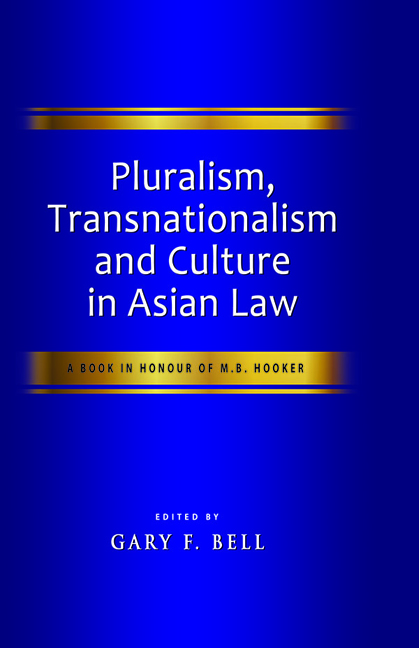Book contents
- Frontmatter
- Dedication
- Contents
- Preface
- Acknowledgements
- About the Contributors
- Chapter 1 M.B. Hooker and Southeast Asian Law: Path-breaking Passions
- Chapter 2 Asian Thought and Legal Diversity
- Chapter 3 Comparative Law, Anti-Essentialism and Intersectionality: Reflections from Southeast Asia in Search of an Elusive Balance
- Chapter 4 Legal Pluralism and Legal Anthropology: Experiences from Indonesia
- Chapter 5 Mapping the Relationship of Competing Legal Traditions in the Era of Transnationalism in Indonesia
- Chapter 6 Indonesia's Weak State Courts and Weak Law Fare Poorly in a Pluralist Commercial World
- Chapter 7 When Laws Are Not Enough: Ethics, Aesthetics, and Intra-Religious Pluralism in Contemporary Indonesia
- Chapter 8 Legal Pluralism and the Constitutional Position of East Malaysia's Indigenous Peoples: The View from the Longhouse
- Chapter 9 Sharia, State and Legal Pluralism in Indonesia: How Law Can You Go?
- Chapter 10 Negotiating Legal Pluralism in Court: Fatwa and the Crime of Blasphemy in Indonesia
- Chapter 11 Islamic Law in Israel: A Case Study in Legal Pluralism
- Chapter 12 The Road to Democracy Goes Through Religious Pluralism: The Indonesian Case and Thoughts on Post-Mubarak Egypt
Chapter 3 - Comparative Law, Anti-Essentialism and Intersectionality: Reflections from Southeast Asia in Search of an Elusive Balance
Published online by Cambridge University Press: 12 January 2018
- Frontmatter
- Dedication
- Contents
- Preface
- Acknowledgements
- About the Contributors
- Chapter 1 M.B. Hooker and Southeast Asian Law: Path-breaking Passions
- Chapter 2 Asian Thought and Legal Diversity
- Chapter 3 Comparative Law, Anti-Essentialism and Intersectionality: Reflections from Southeast Asia in Search of an Elusive Balance
- Chapter 4 Legal Pluralism and Legal Anthropology: Experiences from Indonesia
- Chapter 5 Mapping the Relationship of Competing Legal Traditions in the Era of Transnationalism in Indonesia
- Chapter 6 Indonesia's Weak State Courts and Weak Law Fare Poorly in a Pluralist Commercial World
- Chapter 7 When Laws Are Not Enough: Ethics, Aesthetics, and Intra-Religious Pluralism in Contemporary Indonesia
- Chapter 8 Legal Pluralism and the Constitutional Position of East Malaysia's Indigenous Peoples: The View from the Longhouse
- Chapter 9 Sharia, State and Legal Pluralism in Indonesia: How Law Can You Go?
- Chapter 10 Negotiating Legal Pluralism in Court: Fatwa and the Crime of Blasphemy in Indonesia
- Chapter 11 Islamic Law in Israel: A Case Study in Legal Pluralism
- Chapter 12 The Road to Democracy Goes Through Religious Pluralism: The Indonesian Case and Thoughts on Post-Mubarak Egypt
Summary
My motivations for undertaking this essay were partly biographical. I was raised in Canada and undertook my initial legal training there. I then went to the United Kingdom for postgraduate studies and now work in Southeast Asia. By way of larger background, my family has roots in East Africa and before that in India. Through all of this geographical diversity runs the influence of the English common law; lawyers in all these jurisdictions would immediately recognize a reference to rotten snail-tainted ginger beer, and why that helps to answer the question “Who is my neighbour?”, and also with the assertion that, in summertime, village cricket really is the delight of everyone. At the same time, these jurisdictions are very diverse. They are historically and culturally shaped by different forces and incorporate in their legal systems very different influences. Canada has a written criminal code, but this is different from the written penal code in India and Singapore, although those last two are so similar that debates about section 377A of the Penal Code in Singapore would immediately be comprehensible to an Indian lawyer. An Indian, Singaporean, Australian and Canadian lawyer may also share a reference to the case of Liversidge v. Anderson, though it is interpreted differently in these jurisdictions. If your “tribe” is the Kikuyu or the Kalenjin, for example, your customary or indigenous law will have a greater place in the contemporary law of your country (Kenya) than if your tribe is the Haida or Cree in Canada. Muslim personal law is officially recognized in India through the regular courts, and in Singapore and Kenya through the Syariah and Kadi courts respectively; it has a rather lesser role in Canada and the United Kingdom. The list could go on.
In considering the jurisdictions with which I have personal connections, therefore, I am struck by the paradox of familiarity and similarity, on the one hand, and of opacity and difference on the other. Students at my university in Singapore, for example, have no problem in considering and receiving precedents from the United Kingdom or Canada or India, but they would hardly think of Cambodia or Thailand or Indonesia: jurisdictions that are geographically so much closer. When they travel to other common law environments on exchange, they know that they share a language — literal, legal and metaphorical — with their new classmates.
- Type
- Chapter
- Information
- Pluralism, Transnationalism and Culture in Asian LawA Book in Honour of M.B. Hooker, pp. 52 - 69Publisher: ISEAS–Yusof Ishak InstitutePrint publication year: 2017

